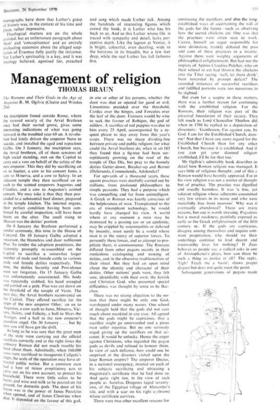Management of religion
THOMAS BRAUN
The Romans and Their Gods in the,Age of Augustus R. M. Ogilvie (Chatto and Windus 21s)
An inscription found outside Rome, where the revered society of the Arval Brethren once had their sacred grove, gives some interesting indications of what was going forward in the troubled year 69 AD. A revolu- tion had lately driven the emperor Nero to suicide, and installed the aged and rapacious Galba. On 3 January, the inscription says, the Arval brethren, all of them senators of high social standing, met on the Capitol to carry out a vow on behalf of the safety of the new emperor. This they did by sacrificing an ox to Jupiter, a cow to his consort Juno, a cow to Minerva, and a cow to Safety. In an adjacent temple they then sacrificed an ox each to the sainted emperors Augustus and Claudius, and a cow to Augustus's sainted consort. We may take it that they then pro- ceeded to a substantial beef dinner, prepared in the temple kitchen. The internal organs, their perfect condition having been con- firmed by careful inspection, will have been burnt on the altar. The smell rising to I-leaven was the deities' portion.
On 8 January the Brethren performed a similar ceremony, this time in the House of Concord. On 10 January Galba adopted a successor, the blameless and dour nobleman Piso. To render the adoption propitious, the fraternity promptly re-assembled on the Capitol to sacrifice -a somewhat larger number of male and female cattle to various male and female deities respectively. This time, the deities Security and Providence were not forgotten. On 15 January Galba was unfortunately assassinated. His body was repeatedly stabbed, his head mangled and carried on a pole. Piso was cut down on the threshold of the temple of Vesta. The next day, the Arval brothers reconvened on the Capitol. They offered sacrifice for the reign of the new emperor Otho: an ox to Augustus, a cow each to Juno, Minerva, Vic- tory, Safety, and Felicity, a bull to Mars the Avenger, and a bull to the new emperor's guardian angel. On 30 January . . . but by now you will have got the drift. As long as he was sure that the great men of the state were carrying out the official sacrifices correctly and at the right times the ordinary Roman did not much trouble his head about them. Admittedly, when 160.000 cows were sacrificed to inaugurate Caligula's reign, the scale of the operation may have at- tracted public notice. But a common man had a host of minor propitiatory acts to carry out on his own account, to protect his household. There were little cakes to be burnt, and wine and milk to be poured on the ground, for domestic gods. The door of his house was in the power of Janus Patulcius when opened, and of Janus Clusivius when shut. it depended on the favour of this god, in one or other of his persons, whether the door was shut or opened for good or evil. Limentinus presided over the threshold, Cardea over the hinges, and Forculus over the leaf of the door. Farmers would be wise to seek the favour of Robigus, the god of mildew. A sacrifice of red puppies was due to him every 25 April, accompanied by a re- quest please to stay away from this year's crops. There was no sharp dividing-line between private and public religion: for what could the Arval brethren do, when in AD 183 they found that a fig-tree had been sur- reptitiously growing on the roof of the temple of Dea Dia, but pray to the homely' deities Getter-down, Breaker-up and Burner (Deferunda, Commolenda, Adolenda)?
For -upwards of a thousand years, these quaint practices were dutifully carried out by millions, from profound philosophers to simple peasants. They had a purpose which was compelling and far from unintelligent. A Greek or Roman was keenly conscious of the helplessness of man. Transplanted to the era of triumphant technology, he would hardly have changed his view. A world where at any moment a man may be destroyed by a passing car or an epidemic, may be crippled by osteomyelitis or debased by insanity, must surely be a world where man is at the mercy of superior forces. To personify these forces, and to attempt to pro- pitiate them, is commonsense. The Romans differed from other pagans mainly in their meticulous cataloguing and naming of deities, and in the obsessive traditionalism of their ritual. But they had an open mind about the identity and character of their deities. Other nations' gods were, they felt sure, identifiable with their own: the Jewish and Christian God, who presented special difficulties, was thought by sonic to be Bac- chus.
There was no strong objection to the no- tion that there might be only one God, worshipped under many names. One school of thought held that the gods did not care much about mankind in any case. All agreed that the gods might be capricious, that a sacrifice might go unrewarded and a pious man suffer injustice. But no one seriously urged giving up the sacrifices on that ac- count. It would be unlucky. Hence the anger against Christians, who regarded the pagan gods as devils and refused to honour them. In view of such defiance, how could one be surprised at the disasters visited upon the later Roman empire? The emperor Decius, in a national emergency, insisted on each of his subjects sacrificing and obtaining a magistrate's certificate that he had done so. And quite right too, in the view of such people as Aurelius Diogenes (aged seventy- two, of the Egyptian village of Alexander's isle, and with a scar on his right eyebrow) whose certificate survives.
There were two other excellent reasons for continuing the sacrifices, and also the long- established ways of ascertaining the will of the gods for the future—such as observing how the sacred chickens ate. One was that the practices were often seen to work. Cicero, himself an augur responsible for state divination, frankly debated the pros and cons of these practices in a treatise. Against them were weighty arguments of philosophical enlightenment. But had not the impiety of Appius Claudius Pulcher, who on their refusal to eat had thrown the chickens into the Tiber saying, 'well, let them drink', been rewarded by prompt defeat? The recorded instances of successful sacrifices and fulfilled portents were too numerous to be slighted.
But even for a sceptic in these matters, there was a further reason for continuing with the established religion. For the Romans, their religion was part of the ancestral foundation of their society. They felt much as Lord Chancellor Thurlow did when in 1788 he replied to a deputation of dissenters: 'Gentlemen, I'm against you, by God. I am for the Established Church, darn- me! Not that I have any more regard for the Established Church than for any other Church, but because it is established. And if you can get your damned religion established, be for that too.'
Mr Ogilvie's admirable book describes in detail how Roman religion was managed. It says little of religious thought: and of this a Roman would have heartily approved. For in his view religion was not a matter of thought but of practice. The practice was dignified and usually harmless. It was 'a line, yet tolerant religion whose adherents committed very few crimes in its name and who were mercifully free from neurosis. Why was it eventually abandoned? There are many reasons, but one is worth stressing. Paganism has a moral weakness, painfully exposed as early as the Greek enlightenment of the fifth century ac. If the gods are capricious, disagree among themselVes and require con- stant propitiation, why should we their underlings continue to lead decent and trustworthy lives for nothing? If Zeus behaves as people say, a radical asks in one of Aristophanes's plays, how can there be such a thing as justice at all? The reply. 'Ugh ! Fetch me a basin', shows proper disgust but does not quite meet the point.
Subsequent generations of pagans made
serious attempts to give the gods greater moral stature, but with incomplete success. The pagan gods, however frightening, never became entirely respectable. Worshippers who long to be good themselves require a God who is all-good and all-wise. This need was fulfilled by Judaism, Christianity and Islam, the three 'religions of the Book' which divided the Roman world between them. But in giving its peoples a higher vision of God, they left them with a new problem: why is it that such a God allows the good to suffer? The problem exercises religious people to this day. It is interesting to reflect that for a world dominated by the pagan gods, suffer- ing, however bitter, had never been a problem at all.



































 Previous page
Previous page